
The Kenya eTA (Electronic Travel Authorization) is an electronic permit required for many foreign nationals before entry into Kenya.
For Bahrain citizens, the Kenya eTA is a substitute for the old visas for the majority of short-term stays (tourism, business, medical visitation) under the current Kenyan entry regulations.
The Kenya eTA is an obligatory travel document for Bahraini citizens (except those exempt under special conditions) before a flight to Kenya.
The purpose of Kenya’s transition to the eTA system is to simplify entry, enhance security screening in advance, and minimize congestion at ports of entry.
All Bahraini passport holders (regular citizens) seeking to visit Kenya must apply for a Kenya eTA if they are not exempted under Kenya’s immigration policy.
Minors (children) with Bahraini nationality must also have their individual Kenya eTA, even if accompanied by parents.

Bahrain citizens transiting through Kenya without leaving the airport terminal might not need the full Kenya eTA (subject to the airport and flight plan), but if leaving the transit area or spending an overnight stay, the eTA is required.
Bahrain citizens intending multiple entries to Kenya must verify if the eTA they acquire has any provision for reentry under special regional travel arrangements (e.g., with East African Community nations) or if a new permit is required for every entry.
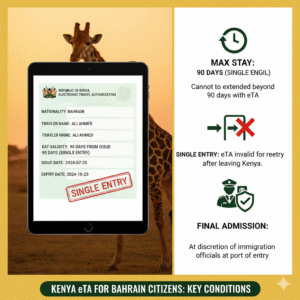
The Kenya eTA typically accommodates a stay for a maximum of 90 days (three months) from the issue date.
The eTA is usually valid for a single entry, i.e., after the Bahrain citizen enters Kenya on it and leaves, the same eTA cannot be used for reentry (except if special regional reentry rules are in force).
The validity period from the date of issue until the date of expiry may also be restricted (e.g., an eTA should be utilized within a specified timeframe, like 90 days).
Bahrain citizens are not able to extend the visit using the Kenya eTA beyond the allowed 90 days (in most situations); in case of a desire for a longer stay, one will need to leave and make a new application or pursue alternative travel authorization.
Immigration officials at ports of entry still reserve the right to admit or refuse individuals, even if they possess a valid Kenya eTA, depending on admissibility determination.
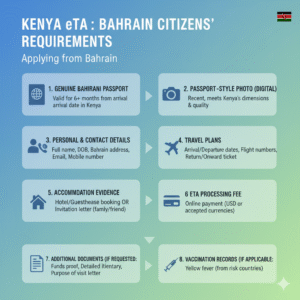
A genuine Bahraini passport with six months’ validity from the expected date of arrival in Kenya.
A passport-style photo (digital) taken recently, meeting Kenya’s required dimensions and quality.
Personal and contact details (full names, date of birth, address in Bahrain, email address, and mobile number).
Travel plans: date of arrival and departure, flight numbers, and evidence of return or onward travel.
Accommodation evidence in Kenya (hotel reservation, guesthouse reservation, or an invitation letter if hosted by a family/friend).
Payment of the Kenya eTA processing fee (in U.S. dollars or other currencies accepted by the system) using the online application platform.
Additional supporting documents may be asked for in some cases (such as evidence of funds, details of travel plans, or a purpose of visit letter).
Vaccination records (for illnesses such as yellow fever) can be required if traveling from or through disease-risk countries.
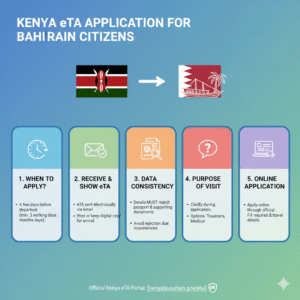
Bahrain citizens’ applications for the Kenya eTA should be made a few days before departure (usually at least 3 working days in advance) to provide processing time.
One can apply early, as often as three months before the travel date.
After approval, Bahraini citizens will be sent the Kenya eTA electronically (by email). They should print or keep a digital copy to show on arrival.
All details provided in the Kenya eTA application must be consistent with the passport and supporting documents to avoid rejection.
Bahraini citizens should clarify the purpose of their visit (tourism, business, or medical) while submitting the Kenya eTA application.
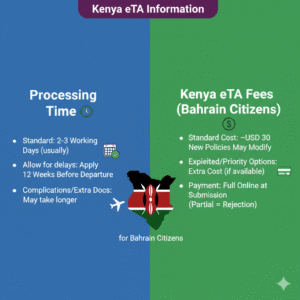
The processing time for Kenya eTA applications for citizens of Bahrain is usually 2–3 working days, barring any complications or requests for additional documentation.
It is a good idea for citizens of Bahrain to apply long in advance (e.g., one to two weeks before departure) to allow for delays.
The cost of the Kenya eTA application for most nationalities is around USD 30 (or its equivalent in foreign currencies), though Kenya’s new policies could modify this.
Expedited or priority options of processing might be available at extra cost (if permissible by the system).
Payment online at application submission time; partial payment results in rejection.
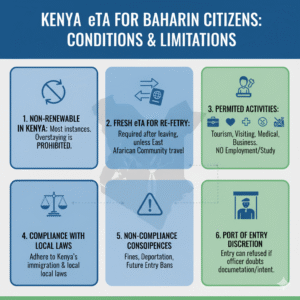
The Kenya eTA acquired by Bahrain citizens is not renewable within Kenya in most instances; overstaying is disallowed.
If citizens of Bahrain leave Kenya and then want to come back, a fresh Kenya eTA is typically required, unless local travel arrangements allow re-entry on the original permission (East African Community).
A Kenya eTA is valid only for authorized activities (tourism, visiting, medical, and business) and does not imply employment, study, or other extended involvement.
Bahrain nationals are required to comply with Kenya’s local and immigration laws while in the country; non-compliance with visa requirements can result in fines, deportation, or bans on future entry.
The port of entry can refuse entry if the immigration officer is not pleased with the traveler’s documentation or intent, regardless of the validity of the Kenya eTA.
Removes the requirement for physical documentation and eliminates time spent on visa procedures before travel.
Allows Bahrain citizens to apply from Bahrain or overseas, without an in-person visit to a physical office.
Supports pre-travel security screenings, lessening delays upon arrival.
Streamlines documents for tourists and short-term business travelers from Bahrain.
Increases the transparency and predictability of the travel authorization procedure.
Apply for the Kenya eTA in good time; never do it last minute.
Double-verify all information (name spellings, passport number, and travel dates) before final submission.
Make use of a passport with enough blank pages and validity (six months after arrival).
Keep a printed or electronic copy of the Kenya eTA approval to produce upon arrival.
Bring backup documents: hotel booking confirmation, flight itinerary, and proof of funds.
If crossing multiple East African borders, check if your Kenya eTA is valid for reentry under regional mobility regulations.
Be aware of changes in Kenya’s immigration law, as conditions can change.
Stay in compliance with all travel, health, and entry restrictions (e.g., vaccinations).
Delays can happen when supporting documents are requested after the initial submission.
Errors in application information can lead to rejection or reapplication.
The Kenya eTA is not a guarantee of entry—it is up to immigration officers upon arrival.
Kenya’s immigration policy might change, impacting current eTA regulations (validity period, exemptions).
If the visitor stays beyond the allowed time, fines or restrictions on future travel for Bahraini citizens can be applied.
The Kenya eTA can be insufficient in certain situations where frequent entry or extended stays are required; other travel authorization might be necessary.
The Kenya eTA for citizens of Bahrain is the official electronic permit required for brief visits to Kenya.
Bahraini citizens need to apply in advance, fulfill all documents and health requirements, and be aware of the allowed length of stay.
The Kenya eTA simplifies travel relative to old visas, but compliance is rigorous to prevent issues at entry or during the visit.
Bahrain citizens planning repeated visits or extended stays should evaluate whether multiple eTAs or alternative permits better suit their travel plans.